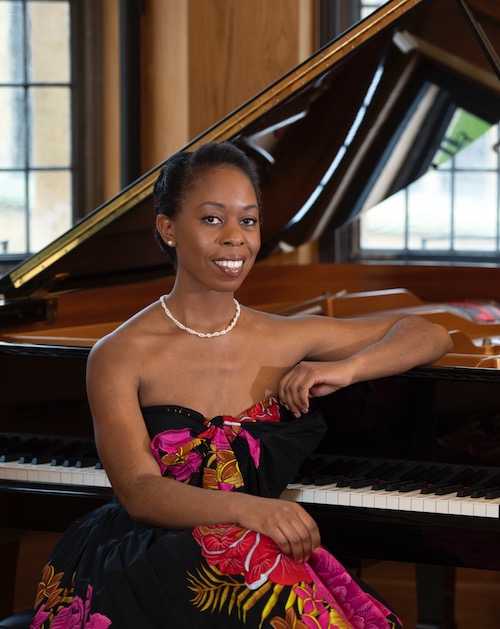New World festival serves up delightful, cross-Atlantic mix of neglected piano music

Samantha Ege was the curator and among the musicians who performed at the New World Symphony’s “Black Renaissance Pianism Across the Pond” program Wednesday night.
Cross-Atlantic connections between African-American and British composers encompassed the program for “Black Renaissance Pianism Across the Pond.” This delightful and enlightening concert of keyboard works, heard Wednesday night at the intimate Truist Pavilion was the high point of the New World Symphony’s “Harlem Renaissance in Europe” festival.
Curated by British pianist and musicologist Samantha Ege, professor at the University of Southampton (who served as the evening’s host), the program served as a sampler of scores by composers both well known and less familiar.
Ege opened the concert with a stellar reading of Moorish Dance by Samuel Coleridge Taylor (1875-1912). This showpiece is steeped in the 19th-century romantic tradition with big surging melodies and a final barrage of fireworks worthy of Liszt. Ege’s nimble articulation brought clarity to the score’s somewhat rambling paragraphs.
Two suites offered the evening’s most distinguished creative and performing artistry. Harry T. Burleigh (1866-1949) was a student of Dvořák at the National Conservatory in the 1890’s. Well known as a concert baritone, pianist and arranger of spirituals, Burleigh combined the romanticism of Dvořák’s musical language with a distinctively American sensibility. His six-movement suite From the Southland paints tonal pictures of poetry (written in dialect) by Louise Alston Burleigh, the composer’s wife. The texts were projected on the hall’s wall and read on tape by actress Melba King.
A sad and nostalgic melody opens “Through Moanin’ Pines” but the mood changes with the catchy, vital rhythms of ‘The Frolic” in the spirit of Louis Moreau Gottschalk. The poetic serenity of “In the Col’ Moonlight” contrasts with the buoyant spirit of “A Jubilee.”
“On Bended Knee” directly quotes the spiritual “Nobody Knows the Trouble I’ve Seen” in grandiose brilliance. The hymn-like “A New Hidin’ Place” concludes this melodically inspired, vital set of charming vignettes. New World fellow Noah Sonderling exhibited a sensitive touch and eloquent phrasing as well as rapid dexterity in the folk-infused sections.
In the Bottoms, five vignettes by the Canadian-born Robert Nathaniel Dett (1882-1943,) proved masterfully conceived and brimming with originality. Solemn arpeggiated chords open the initial “Prelude: Night” before dance-like rhythms test the player’s speed and technique.
Americanized Rachmaninoff seems to pervade “His Song” while ragtime and gospel influences set “Honey (Humoresque)” on a fleet path. A swaying pulse pervades “Barcarolle: Morning.” This movement would make a terrific encore piece for keyboard recitals. The infectious, robust melody of “Juba (Dance)” concludes this confection to delightful effect. Dett (whose oratorio The Ordering of Moses has received multiple revivals) constantly surprises the listener with changing harmonic patterns and thematic paths that run in unexpected directions.
The composer also challenges the full panoply of the player’s technique and musicianship. William Eddins, the conductor of last weekend’s orchestral program, was the New World’s first keyboard fellow during its initial mini-season in 1988. Thirty-five years later, his impressive piano command and interpretive sensibilities continue to characterize his playing. In a high-voltage performance, Eddins made the music gleam with brilliant agility, supple dynamics, and a clear affinity for Dett’s bouillabaisse of sacred and indigenous influences.
The life and career of singer-pianist-composer Nora Holt (1885-1974) could become a cinematic melodrama. Most of her over two hundred compositions have been lost. That is unfortunate because her Negro Dance is an engaging and spiky amalgamation of Chopin and piano rags.
By contrast, Three African Dances by British composer Amanda Aldridge (1866-1956), daughter of Shakespearean thespian Ira Aldridge, emerged as simplistic and naive. Aldridge’s African-inspired music recalled Elgar’s bloated evocation of British colonial India. The work’s second section “Luleta’s Dance” suggested Eastern thematic tints in the picture postcard manner of Albert Ketelbey’s dated orchestral portraits. The Holt and Aldridge were played with fluency and fine coordination by New World fellow Wesley Ducote, whose hands were a blur in the rapid flourishes of Aldridge’s “Dance of the Warriors”.
Except for Ege, all the pianists played without scores which was all the more remarkable since they told the audience that they were totally unaware of the music prior to the planning of the concert. The entire evening was a stimulating iteration of enlightened musical research and high performance standards.
Nicholas Collon conducts the New World Symphony in Gabriela Ortiz’s Antrópolis, Tchaikovsky’s Violin Concerto with Randall Goosby and John Adams’ Absolute Jest with the New York Philharmonic’s string principals 7:30 p.m. February 17 and 18 at the New World Center in Miami Beach. nws.edu
Posted in Performances
Leave a Comment
Thu Feb 9, 2023
at 11:37 am
No Comments






